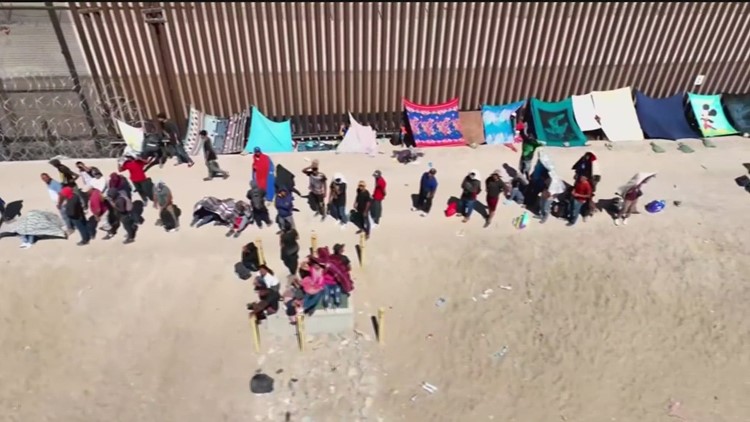TEXAS, USA — The 5th Circuit Court of Appeals heard arguments Wednesday over a controversial Texas immigration law that would allow state officials to jail and prosecute migrants suspected of crossing the border illegally.
This comes a day after the U.S. Supreme Court briefly allowed the law, Senate Bill 4, to go into effect for just a few hours before the 5th Circuit temporarily put another hold on it.
Attorneys for both sides made their arguments Wednesday for why the hold should or should not be continued as a lawsuit challenging its constitutionality plays out. It's not clear when the next decision might come.
Harris County Judge Lina Hidalgo issued a statement on the law Wednesday saying, in part, that the law could be used to target people just for "looking like an immigrant." Read her full statement below:
“I’m an immigrant myself and I lead a massive county where almost 25 percent of the population are immigrants. Under SB 4, it’s conceivable that an anti-immigrant officer could arrest someone for little more than them “looking like an immigrant.” That possibility alone makes our community nervous, and with good reason. I’ll be the first to say that our immigration system and border security have major challenges. There is an opportunity to fix these with the bipartisan bill President Biden, Leader McConnell and senior Republican leaders moved forward until Trump demanded that Republicans continue politicizing immigration rather than solving it. Fundamentally SB 4, which purports to give states the authority to – like sovereign nations – make their own immigration laws, shows disheartening disrespect for the United States constitution and for the rule of law."
During the short time the law was in effect Tuesday, Texas authorities did not announce that any arrests had been made or say whether it was being actively enforced. Along the border in Kinney County, Sheriff Brad Coe embraced the arrest powers but said deputies would need probable cause.
“It is unlikely that observers will see an overnight change,” said Coe, whose county covers a stretch of border near Del Rio that until recently had been the busiest corridor for illegal crossings but has quieted considerably.
The Supreme Court did not rule on the merits of the law. It instead kicked back to the lower appeals court a challenge led by the Justice Department, which has argued that Texas is overstepping the federal government's immigration authority.
The impact extends far beyond the Texas border. Republican legislators wrote the law so that it applies in all of the state’s 254 counties, although Steve McCraw, the director of the Texas Department of Public Safety, has said he expects it will mostly be enforced near the border.
Other GOP-led states are already looking to follow Texas’ path. In Iowa, the state House on Tuesday gave final approval to a bill that would also give its state law enforcement the power to arrest people who are in the U.S. illegally and have previously been denied entry into the country.
It now goes to Republican Gov. Kim Reynolds. If signed, it would take effect in July.
Daniel Morales, an associate professor of law at the University of Houston Law Center, said the Texas law "will be a mess, very clearly, to enforce.”
“It’s very clear that Greg Abbott wants to enforce the law so he can get lots of photo ops and opportunities, but it’s gonna take a lot of state resources to implement. And I don’t know, in fact, how much appetite and capacity for that the state government actually has,” Morales said. Texas will find enforcement is “difficult and taxing,” he said.
Arrests for illegal crossings fell by half in January from a record-high of 250,000 in December, with sharp declines in Texas. Arrests in the Border Patrol's Del Rio sector, the focus of Abbott's enforcement, fell 76% from December. Rio Grande Valley, the busiest corridor for illegal crossings for much of the last decade, recorded its fewest arrests since June 2020.
___
Associated Press writers Acacia Coronado in Austin, Texas, Juan Al. Lozano in Houston, Christopher Sherman in Mexico City and Scott McFetridge in Des Moines, Iowa, contributed to this report.



